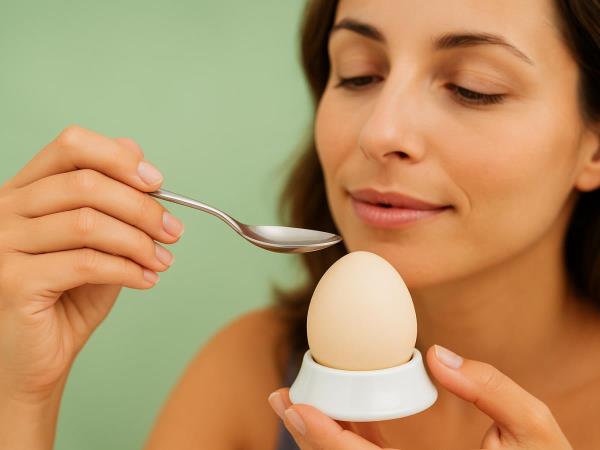The explanation is simple: eggs contain proteins that keep us full for longer, so we eat fewer snacks throughout the day. Additionally, they do not cause a rapid spike in blood sugar, which means that energy is released slowly and evenly.
Eggs against inflammation in the body
Inflammations are the silent enemy of modern times. They are linked to heart diseases, diabetes, and even faster aging. Eggs contain phospholipids, special substances that have been proven to reduce inflammatory processes in the body.
Studies have shown that people who have enough eggs in their diet and choline nutrients (this is a substance found in the yolk and protects the liver) show fewer signs of chronic inflammation. And less inflammation means a healthier heart, better fat breakdown, and slower aging.
Good lipid profiles or why eggs strengthen the heart
For years, nutritionists warned against the cholesterol in egg yolks. But today we know that the story is more complex. There are indeed "good" and "bad" cholesterol. Eggs help increase good cholesterol (HDL), which clears the veins and reduces the risk of heart diseases.
A study from China (2020), where more than 400,000 people were followed, showed that those who ate one egg a day had an 18% lower risk of heart diseases and 28% lower risk of stroke compared to those who did not eat eggs.
Eggs for muscles, food after exercise
When you exercise, your muscles need building material to recover. An egg is one of the best natural solutions, as it contains all nine essential amino acids (these are the protein building blocks that the body cannot create on its own). Among them is lysine, which is essential for muscle recovery and a better response to stress.
The World Health Organization (WHO) recommends that a person consumes about 30 mg of lysine per kilogram of body weight. One serving of eggs already covers almost a quarter of these daily needs.
Immune system and thyroid
One thing that is often overlooked is that one egg contains 25% of the daily selenium requirement. Selenium is a mineral that helps the immune system defend against infections and regulates thyroid function.
This is especially valuable during epidemics and colds. People with enough selenium in their bodies find it easier to fend off viruses and bacteria, as confirmed by research in Europe between 2020 and 2022.
- Energy throughout the day
An egg is a real energy bomb in a small package. One large egg contains about 18% of the daily requirement for vitamin B2 (riboflavin). This vitamin helps the body convert food into energy. So, by eating an egg in the morning, you ensure a more consistent energy level throughout the day, without the crashes caused by sweet drinks or pastries.
- Healthier skin, hair, and nails
B vitamins found in eggs (B2, B5, and B12) are key to healthy skin, hair, and eyes. Additionally, the yolk is rich in biotin – a vitamin that is particularly important for nails. If you have brittle and fragile nails, regularly consuming eggs can help strengthen them.
A study from Germany (2021) confirmed that in people who had issues with brittle nails, after three months of consuming biotin-rich foods (including eggs), fragility decreased by 25%.
- Eggs as brain food
Nutritionists often say that eggs are "brain food." This is not a coincidence. The yolk contains choline, which is essential for nerve cell function and the formation of acetylcholine, a signal transmitter in the brain.
Research has shown that people with low levels of choline tend to have more memory and concentration problems. A study from the USA (2025) found that people who ate one egg a day performed 12% better on cognitive tests than those who did not.
In addition to choline, eggs are also a source of omega-3 fatty acids, which are associated with a lower risk of dementia, arthritis, and osteoporosis.
- Traditional wisdom about eggs
In rural areas, eggs have always been considered "strength food." Grandmothers often said that a recovering patient must eat an egg to regain strength. Eggs were also frequently given to children for breakfast because it was believed they "nourish the head" – today we know this is related to choline and proteins, which indeed help the brain.
During World War II, eggs were so precious that in some countries, they were used as a means of payment. This shows how important they were as a source of nutrients when food was scarce. - Eggs as brain food
What about the risks?
Of course, the question arises: does eating an egg a day increase the risk of cholesterol and heart diseases? Old research hinted at this, but today we know that eggs themselves are not the culprit. A bigger problem arises from a combination of an unhealthy diet – lots of processed foods, saturated fats, and little exercise.
The American Heart Association (AHA) issued a recommendation in 2020 that one egg a day is safe for healthy adults and even brings benefits when included in a balanced diet.
A small package with a big impact
An egg is one of the most complete foods we know. In a small package, you get proteins, vitamins, minerals, fats, and antioxidants. By eating one egg every day, you can strengthen your heart, improve your memory, boost your immune system, and even take care of your skin and hair.
And best of all, eggs are inexpensive, accessible, and can be prepared in a hundred ways.
Though the myth about cholesterol has long scared us, today we know that one egg a day is not a threat but an opportunity to give your body what it truly needs.









 Would you like to be informed about news on the website?
Would you like to be informed about news on the website?

